 Petzlover
Petzlover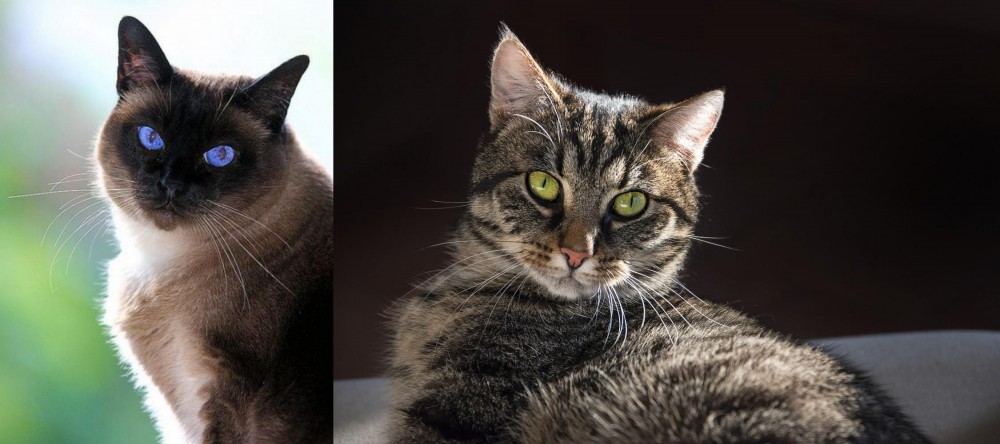 Applehead Siamese is originated from Thailand but European Shorthair is originated from Sweden. Both Applehead Siamese and European Shorthair are having almost same weight. Applehead Siamese may live 7 years more than European Shorthair. Both Applehead Siamese and European Shorthair has same litter size. Both Applehead Siamese and European Shorthair requires Low Maintenance.
Applehead Siamese is originated from Thailand but European Shorthair is originated from Sweden. Both Applehead Siamese and European Shorthair are having almost same weight. Applehead Siamese may live 7 years more than European Shorthair. Both Applehead Siamese and European Shorthair has same litter size. Both Applehead Siamese and European Shorthair requires Low Maintenance.
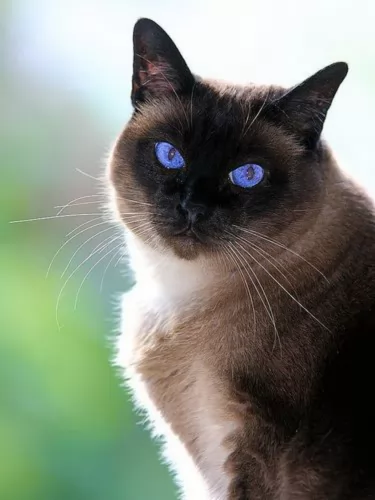 As the traditional Siamese cats from Siam, now known as Thailand, this ancient breed of cat goes back to 1350AD. It is believed that these Traditional Siamese cats were first exported to the west in the 19th century.
As the traditional Siamese cats from Siam, now known as Thailand, this ancient breed of cat goes back to 1350AD. It is believed that these Traditional Siamese cats were first exported to the west in the 19th century.
The Applehead is a Siamese cat that looks the way Siamese looked when they were first brought out to the United States in the 19th century. Breeding with other cat breeds is what developed the Applehead Siamese.
The Applehead seal point was also imported to Britain. Breeders have developed other point colors and head shapes by cross-breeding long- and short hairs, but all Siamese are essentially bred from the Applehead seal point.
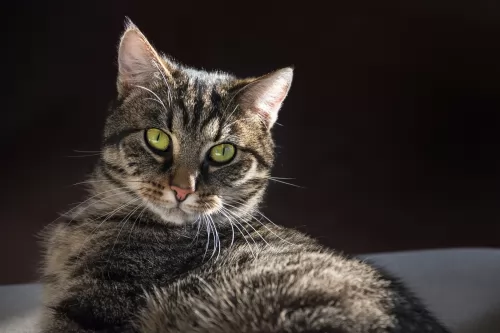 The European Shorthair is a cat breed that hails from Sweden but it also has roots that go back to the Roman Empire.
The European Shorthair is a cat breed that hails from Sweden but it also has roots that go back to the Roman Empire.
It is referred to as a natural cat breed, which means that the cat came about naturally without any human intervention.
The cat has had great hunting skills and this has what has made it sought after as a cat to keep rodents at bay. It became a famous housecat as well.
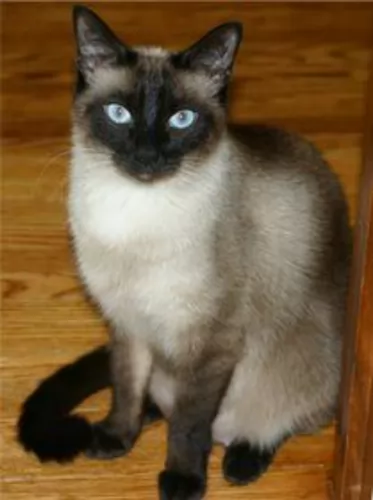 There is no denying that the very recognizable Siamese cats are one of the most popular cat breeds there are, known also for being very vocal.
There is no denying that the very recognizable Siamese cats are one of the most popular cat breeds there are, known also for being very vocal.
The female Applehead weighs between 3 and 5kg and the male might weight a bit more, as much as 6,8kg.
Siamese cats are all born white but as they mature they develop their deeper color points. There are actually 3 types of Siamese cats, with the Traditional Siamese being known as the Apple Head - the original breed of Siamese.
This particular Siamese is a bit bigger and larger-boned than the modern Siamese, with the body being more muscular and heavier. The head of the cat is fairly round- or apple-shaped with the eyes also being somewhat rounder than other types of cats.
The legs are long and the tail long too and the cat has a fairly short, silky coat.
These cats look intelligent and they are, so much so, that it will be important to present them with lots of toys that make them think and require some skills.
They also love receiving attention from their human owners and although they are also vocal, they don’t talk as much as the modern Siamese cats.
They're curious and playful and don’t like being left alone for too long. They also get on well with children and other pets in the home but are inclined to become more attached to one particular person, wanting to follow their favorite human around.
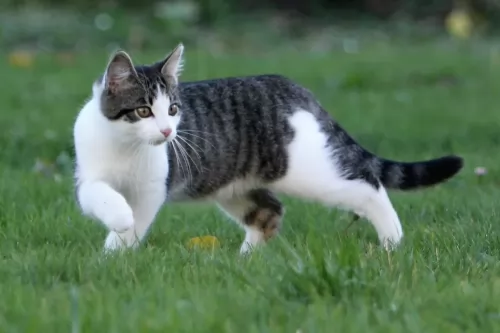 These domestic cats of Europe are a medium- to large-sized cat, weighing between 4 and 6kg, though some can be heavier.
These domestic cats of Europe are a medium- to large-sized cat, weighing between 4 and 6kg, though some can be heavier.
The European Shorthair has a fairly large head and medium-sized ears. The body is robust and round shaped. The cat’s short coat without an undercoat comes in a range of colors and patterns such as white, cream, red, black and blue with eyes that are green, yellow, brown or copper or blue.
The European Shorthair is known for its adaptable nature and the cat is able to fit into different lifestyles with ease. It's a cat that will live happily with children, pets, adults and seniors.
The cat loves his human family and loves becoming involved with fun games and activities. It's an intelligent cat too and cat food puzzles help him to think about how to get his food.
Even though your cat is social with his human family, it becomes fairly shy and nervous of strangers.
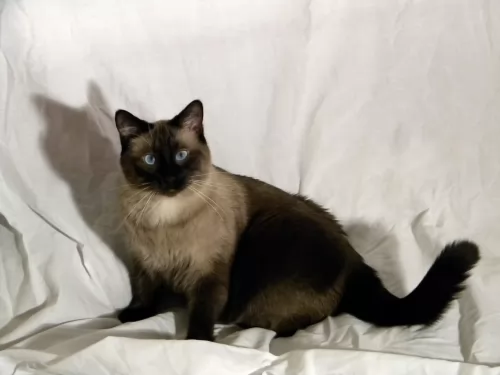 Applehead Siamese cats are very friendly and loving pets. They are intelligent and very beautiful too, with their amazing blue eyes.
Applehead Siamese cats are very friendly and loving pets. They are intelligent and very beautiful too, with their amazing blue eyes.
You will enjoy their friendship as they are prepared to become totally devoted to you, and of course, your playful cat will provide you with lots of laughs and entertainment too. The Applehead Siamese is known to make a splendid pet for you and once you've owned one, you'll think twice before getting another cat breed.
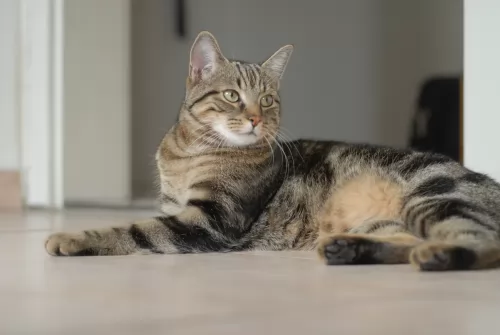 The European Shorthair is such a sweet cat and he is able to adapt fairly easily to new environments. It is such an ideal cat for households with singles, couples, families, and seniors as it adapts its personality to suit, getting on well with other pets as well.
The European Shorthair is such a sweet cat and he is able to adapt fairly easily to new environments. It is such an ideal cat for households with singles, couples, families, and seniors as it adapts its personality to suit, getting on well with other pets as well.
The cat loves his human family and wants to please, but loves to play too, being active and playful. Having one of these cats in your home is like bringing in a treasured gem.
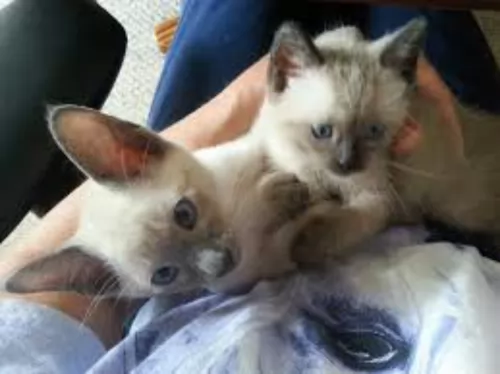 These are a healthy breed of cat and they have always been known to live longer than the modern Siamese cats.
These are a healthy breed of cat and they have always been known to live longer than the modern Siamese cats.
With good care they can live to be up to 20 to 25 years of age. Good nutrition and a loving environment can help to eliminate diseases that the Siamese might have to endure. Some of these can be a blockage in the stomach, skin cancer, feline diabetes, hip dysplasia, and disrupted visual pathway which causes a squint.
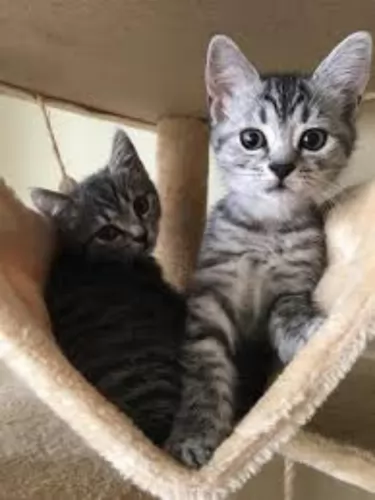 Even if your European Shorthair appears to be well, it is a good idea to get used to taking your cat to the vet for an annual check-up.
Even if your European Shorthair appears to be well, it is a good idea to get used to taking your cat to the vet for an annual check-up.
To provide your cat with the best chance to remain healthy, good diet and exercise is imperative. Look out for an itchy skin too as this could well be a sign that your cat is being plagued by parasites. Parasites can be a terrible problem and it will need to be attended to by your vet.
Parasites and an itchy skin can be a nightmare for your pet and make him most miserable with excessive scratching and licking as well as thinning of hair.
A new kitten will also require being vaccinated to ensure he remains healthy. These injections protect your cat from life-threatening diseases. Usually, vets start vaccines at between 8 – 12 weeks of age to protect your cat against the likes of Feline Leukaemia Virus, Feline Infectious Enteritis and Cat Flu.
There are also other vaccinations you might want to consider such as rabies and chlamydia.
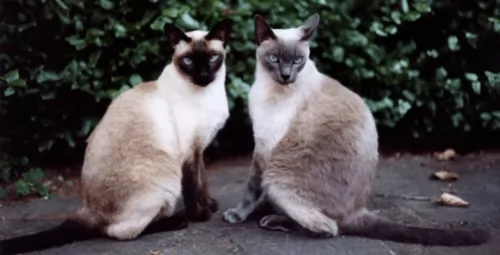 These cats have special nutritional needs and you want to be aware that obesity is a growing problem with modern-day cats. Make sure your Applehead has a healthy diet to maintain a healthy weight so that he keeps his lithe, lean looks.
These cats have special nutritional needs and you want to be aware that obesity is a growing problem with modern-day cats. Make sure your Applehead has a healthy diet to maintain a healthy weight so that he keeps his lithe, lean looks.
You might want to try a little bit of homemade food to enhance your Siamese cat's commercial food which is a mix of top quality meat-based wet- and dry food. You can speak to your vet about feeding your Applehead Siamese because you want to know which food is best for such a cat.
These days the best cat food manufacturers make sure that their cat foods are made up of tasty ingredients such as real chicken and whole brown rice formulated with the right balance of vitamins and minerals to meet the dietary needs of every cat breed and the season of life they are in.
Because of the Siamese cat’s short hair with no undercoat, the cat requires less brushing than other cats.
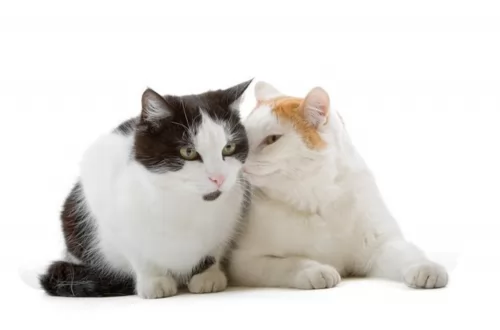 European Shorthairs like to groom themselves, but even so, you want to brush your cat once a week to keep the hair shiny and healthy. Make sure to trim your cat’s claws at the same time. It’s your time to feel for any unusual lumps or scratches on your feline friend’s skin. Check his eyes and make sure they are still bright and clear, look inside the ears to make sure they aren’t becoming clogged with dirt and wax and look inside the mouth to ensure no signs of gum- and tooth disease.
European Shorthairs like to groom themselves, but even so, you want to brush your cat once a week to keep the hair shiny and healthy. Make sure to trim your cat’s claws at the same time. It’s your time to feel for any unusual lumps or scratches on your feline friend’s skin. Check his eyes and make sure they are still bright and clear, look inside the ears to make sure they aren’t becoming clogged with dirt and wax and look inside the mouth to ensure no signs of gum- and tooth disease.
Your cat may well be outgoing with his human family, but his nervousness with strangers will require you providing him with a safe haven of his own. This might be his own bed which should be in a safe, dry, quiet area where he can retreat and feel more secure.
European Shorthairs love being outdoors and particularly if you have a female you’ll want her spayed to avoid her becoming pregnant. Cat shelters are already full of unwanted kittens and you don’t want to add to the burden. Also, have your male neutered too as he is ar less likely to want to roam. Spaying and neutering come with many health benefits too.
Be very careful of your cat’s diet. This is because the domestic cat is a carnivore and still essentially a predator, liking to hunt for their meat. They require a meat diet. However, cats have special dietary requirements and they require a balanced diet. All cats are individuals and they have different food likes and preferences, but they all need the best food there is to remain in peak condition. If you feed your cat commercially manufactured food, always follow the instructions on the label.
Provide your feline pet with cat accessories – food and water bowl, collar and tag, soft bedding, a climbing tree, scratching post, litter box, grooming accessories and toys.